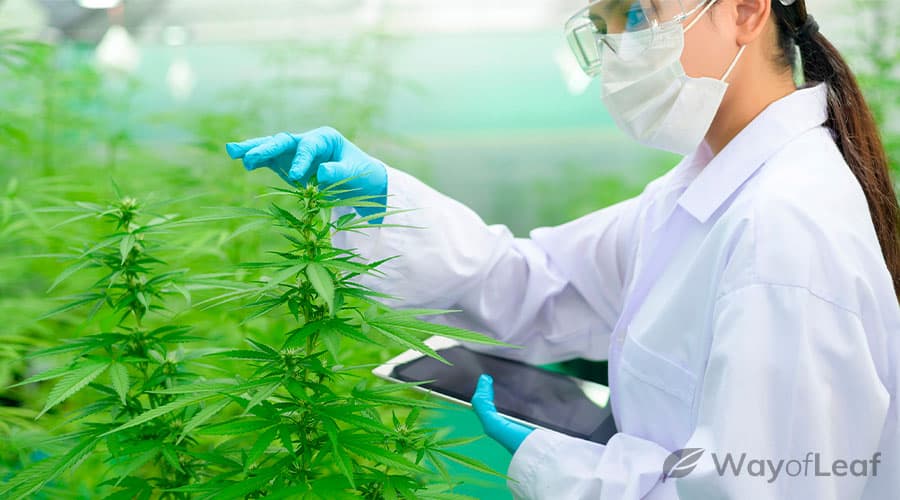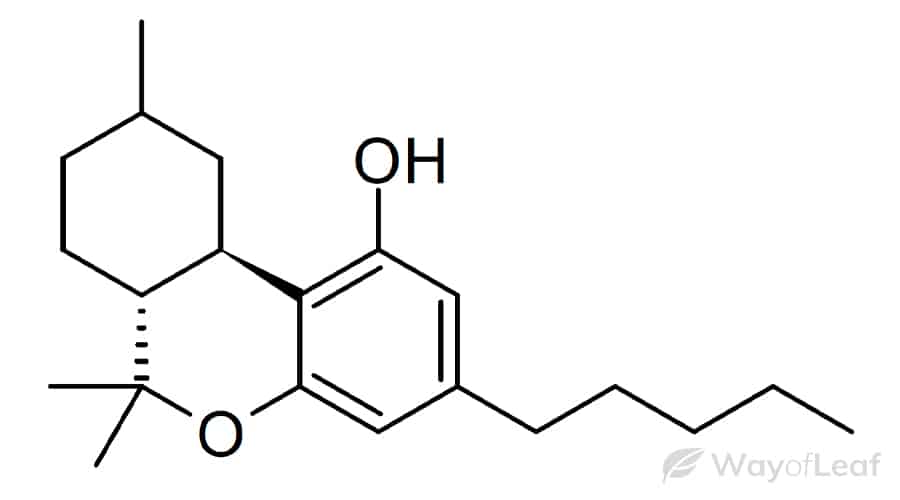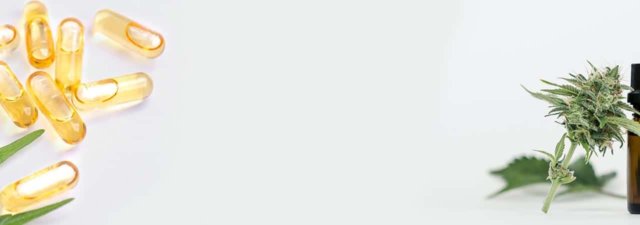Discussions surrounding hemp and marijuana tend to revolve around the cannabinoids THC and CBD. However, each version of the Cannabis Sativa L. plant contains well over 100 other cannabinoids. Further investigation into a few of them has revealed some fascinating effects, not to mention potential benefits.
In recent times, THCs such as delta 8 and delta 10 have become popular alternatives to the delta 9 THC found in marijuana. Much of the appeal boils down to the legal gray area with such cannabinoids, permitting retailers to take a chance by selling them.
Hexahydrocannabinol is another compound that falls into this murky territory. Indeed, it is arguably more confusing because hemp-derived HHC isn’t THC, even though it causes intoxicating effects. However, HHC can come from THC too!
Read on to learn more about the effects, benefits, legality, and risks associated with HHC. The article concludes with a brief overview of three trustworthy HHC sellers and their products.
HHC Meaning & History
Roger Adams, the chemist who identified and isolated CBD in the 1940s, created hexahydrocannabinol in the same decade.
HHC is a hydrogenated derivative of tetrahydrocannabinol (THC). Adams added hydrogen molecules to delta 9 THC in a process called hydrogenation, which converts THC into HHC. For the record, turning vegetable oil into margarine involves a similar process.
Despite being created over 70 years ago, there is minimal research into HHC and its effects. However, we know that using hydrogen atoms to saturate the molecule increases its shelf-life significantly. There are 10+ versions of HHC, including HU211, 7-OH-HHC, and HU243, to go along with the original hexahydrocannabinol.

Unlike THC, HHC has no double bonds. Instead, it has two extra hydrogen atoms. It is the direct opposite of CBN, which is created when THC gains further double bonds as it breaks down. With HHC, the double bonds in THC are broken and replaced with hydrogen, which changes the molecule’s binding affinity for the CB1 and CB2 receptors in the body.
When you purchase HHC, you’ll find that it retains a high percentage of its potency for a lot longer than delta 9-THC. It is significantly more resistant to breakdown when exposed to UV light and heat.
How Is HHC Made?
Although Adams created hexahydrocannabinol from THC, brands that create HHC products use hemp. This is mainly for legal reasons, which we outline in the next section.
The process of making HHC begins with cannabidiol (CBD) extracted from raw hemp. The CBD is distilled and isolated. This product has a powdery texture and is often sold as separate CBD isolate products.
The next step involves converting the isolate into a delta 8 concentrate with at least 96% potency. Following this, you hydrogenate the D8 in HHC using a pair of active catalysts, often heavy metals.
From there, a lot depends on the manufacturer. Many brands say their HHC manufacturing procedure is a “proprietary process” without giving away a great deal. We know that companies must go through a variety of filtration steps to get rid of the metals before bringing the product to market.
Hydrogenating THC involves exposing concentrated THC to hydrogen, high pressure, and a metal catalyst.
Legality aside, one can also create HHC from THC in a laboratory. Hydrogenating THC involves exposing concentrated THC to hydrogen, high pressure, and a metal catalyst like palladium, platinum, or nickel. The catalyst is removed from the mixture once it has completed its task.
A study from 2007 outlined the possibility of converting CBD into different forms of HHC using gastric juice. However, there is practically no further information on this method of making HHC. Finally, there’s also a suggestion that it’s possible to create HHC from a terpene called citronellol.
How companies create HHC also leaves the issue of legality open to debate.
Is HHC Legal?
According to the creators of HHC cannabinoid products, the compound is legal.
Sellers of HHC use hemp and CBD to create their products quite deliberately. CBD is legal under the 2018 Farm Bill because it occurs naturally in the hemp plant. Industrial hemp is now legal to grow in the United States, as long as the maximum delta 9 THC content is 0.3%.
While hemp is best known for producing large amounts of CBD, it has many other cannabinoids. Technically, products containing other hemp cannabinoids remain legal if they don’t exceed the 0.3% THC threshold. Manufacturers of HHC products are adamant that everything is above board.

Matters are complicated by the DEA’s recent update regarding synthetic cannabinoids. In a September 2021 letter, the DEA said that THCs derived synthetically from hemp materials are legal. This is good news for sellers of delta 8 products, and HHC brands doubtless believe the same rules apply to them.
The DEA’s announcement came a year after it had promoted the FDA’s Interim Final Rule (IFR), which stated that synthetic cannabinoids in hemp were illegal while naturally-occurring ones were permitted.
However, there is the small matter of the Federal Analog Act, which makes any analog of a Schedule I drug, such as delta 9-THC, a prohibited substance.
Overall, it seems as if the DEA’s statement allows the sale of HHC. Nonetheless, many states have opted to prohibit the sale and use of HHC. These include:
- Arkansas
- Idaho
- Mississippi
- Montana
- New York
There are also question marks about its legality in many other states. As a result, you use HHC at your own risk, given how unclear the law is.
Is HHC Stronger Than Delta 9 THC?
It is difficult to ascertain the precise potency of HHC due to the lack of research into it. Indeed, even manufacturers of HHC products acknowledge a lack of consistency. The ratios of inactive to active HHC molecules can vary from one batch to another. While these companies do their best to increase the level of active compounds in a product, they don’t have full control.
According to its chemical structure, it seems likely that HHC is stronger than delta 8 but not as potent as delta 9. Estimates vary, but hexahydrocannabinol is probably up to 80% as intoxicating as D9.
As a rule, any THC form with four or more carbons in its side chain produces intoxicating effects. For instance, delta 8, delta 9, and delta 10 THC all possess five carbons, as does HHC. Incidentally, THCP, the most potent form of THC, has seven carbons.
Does HHC Get You High?
Yes. HHC will cause intoxication, albeit not at the same level as the delta 9 THC you find in marijuana.
Those who have used it say HHC effects are similar to THC, including euphoria, altered auditory and visual perception, and changes in cognition. In general, you can expect effects closer to delta 8 THC in terms of relaxation. However, other users claim they feel energetic with a sharper mind.
What Benefits Does HHC Offer?
A lack of scientific evidence means the apparent benefits of the HHC cannabinoid are primarily anecdotal.
An old study from 1977 tested HHC on rats. The researchers found that the cannabinoid could share properties with narcotic painkillers, but significant differences existed.
The 2007 study mentioned earlier tested HU211 and HU243 on mice. It found that HHC prolonged sleeping time by between 80% and 700%. The researchers also wrote that the cannabinoid showed delta 9-THC-like effects in the mice, with less potent pharmacological effects.
Meanwhile, a 2011 study looked into a pair of HHC analogs, LYR-7 and LYR-8. It found that the compounds could potentially inhibit tumor cell growth and angiogenesis, a major step in forming tumors.
A study published in 2010 found that HHC’s effects lasted a long time in rats. Overall, apart from the limited research outlined in this section, there is nothing else to link HHC with the benefits claimed by manufacturers. Certainly, there are no studies on humans that provide any insight.
Apart from suggestions that it has painkilling potential, HHC could have the following benefits:
- Relief from anxiety
- Euphoria
- Relaxation
- Cerebral and bodily intoxication
- Reduced inflammation
- Alleviation of nausea and vomiting
- Improved sleep
If it is indeed 80% as potent as delta 9-THC, individuals with a low THC tolerance should approach HHC with caution. Use no more than 3-5mg at first to gauge how it affects your body and mind.
HHC Side Effects
Given its similarities to THC, and the fact it is almost as intoxicating, the following side effects are possibilities based on what we know about delta 9:
- Dizziness
- Dry mouth
- Heightened anxiety and paranoia
- Insomnia
- Increased appetite
- Elevated heart rate
- Red eyes
Significantly more research is required, but in general, HHC is likely to have similar adverse effects to delta 9 THC.
What Are the Dangers of Cannabinoids Like HHC?
No one knows for sure. HHC manufacturers suggest that it is perfectly safe since it comes from the hemp plant. Once again, though, the lack of research is a concern. While there are no existing reports on side effects, this doesn’t necessarily mean it is safe. HHC products are new to the marketplace, so there is little data on short to medium-term adverse effects, let alone long-term problems.
Another major issue is the lack of regulation. While many companies sell HHC products, only a handful are well-known. Unscrupulous HHC suppliers sell unsafe and potentially harmful formulas to hemp brands that unknowingly pass these toxic products on to consumers. Also, many HHC products won’t pass potency tests since they only contain minimal quantities of the compound.
HHC is a relatively new cannabinoid, so its safety profile is not yet certain.
For the record, 9-beta-hydroxy-hexahydrocannabinol is the most common form of HHC on the market. It’s a fully synthetic HHC version and difficult to differentiate from delta 8 in lab tests. Unfortunately, some brands mix HHC with D8 to lower their prices.
Furthermore, there are many HHC vape cartridges on the market. Given the link between vaping and possible lung illnesses, one must exercise caution when buying HHC products. The process of vaping itself is potentially harmful, even if the product is of premium quality.
In any case, stick to the few reputable companies that sell this cannabinoid and always look for lab reports. We outline the brands worth considering a little later on.
Does HHC Show up on a Drug Test?
This is another unknown. Naturally, HHC manufacturers claim it doesn’t show up on standard 5-panel and 10-panel drug tests. The suggestion is that HHC doesn’t metabolize into 11-hydroxy-THC metabolites like delta 8 or delta 10. It is this metabolite that drug tests can detect.
If HHC is undetectable in a drug screening, it would surely become an incredibly popular product. Having the opportunity to enjoy an intoxicating substance without being caught by a test is appealing.
However, we must emphasize that there’s no evidence one way or the other. If you consume HHC, you have no idea whether a drug screening will find it in your system.
Who Sells the Best HHC Products?
At present, there are only a few reputable HHC sellers or useful products. However, this section features a pair of worthwhile brands.
Moonwlkr
Although Moonwlkr specializes in CBD and delta 8 products, it also sells HHC gummies in several flavors, including Blue Dream Berry. Each gummy in the 25-count bottle contains 12.5mg of HHC. The brand recommends trying one gummy and waiting at least an hour to feel the effects. Users of this product suggest that they feel an energized, euphoric high that helps get them through the day.
If you don’t want to commit to a large container, you can always try the Moonwlkr trial pack, which contains 4 x 12.5mg HHC gummies. Each pack offers two gummies of each flavor so you can decide whether you enjoy the effects. As a bonus, you can also determine your favored flavor!
Binoid
Many lovers of “exotic” cannabinoids recognize Binoid as one of the most trustworthy sellers of HHC. It has among the largest range of HHC products on the market, including:
- Vape cartridges
- Tinctures
- Capsules
- Gummies
- Cookies
The capsules contain 25mg of HHC apiece and are ideal if you want to consume the cannabinoid quickly. Binoid’s tincture contains 1,000mg of HHC, with 33.33mg per ml of liquid.
Final Thoughts on the HHC Cannabinoid
Ultimately, while an HHC product may seem new and exciting, bear in mind that claims as to its efficacy and safety aren’t yet backed by scientific research. It seems likely that HHC has THC-like effects, including intoxication. Users of this cannabinoid report feeling relaxed, calm, and happy after using it. There is even a possibility that it has analgesic effects.
Since it is slightly milder than delta 9 THC, it may prove useful for individuals who find cannabis slightly too strong.
However, the long-term effects of HHC remain known. There is also massive confusion regarding its legality at present. As it can come from industrial hemp, products with no more than 0.3% delta 9 THC could be legal throughout the United States. Furthermore, the DEA has stated that synthetic THCs from hemp are legal, as long as the delta 9 content is low enough. Yet, a growing number of states have outlawed the substance.
If you decide to buy HHC, please take note of the laws in your state. Otherwise, you could find yourself in legal trouble.


![Do Terpenes Get You High? [Understand the Facts!]](https://wayofleaf.com/wp-content/uploads/2019/08/mj_do_terpenes_get_you_high_1920-min-640x225.jpg)









